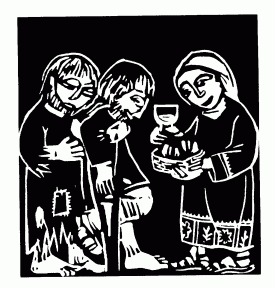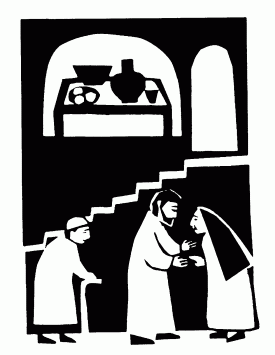22nd Sunday of Ordinary Time - C
28 August 2004

- Introduction [show picture on projector]
- Jesus talks about a banquet and says that if we are giving one, to invite the poor and disabled
- Have any of us ever done that? I haven't.
- Scripture scholars talk about the nature of a parable
- Not meant to be taken literally
- Rather we look at one story and draw parallels to the story of our own lives
- It is an extended metaphor
- But maybe the scripture scholar said that because he finds it inconvenient to actually do what Jesus actually says
- The banquet image is used a lot in Luke's gospel
- Jesus has been described as eating his way through the gospel
- He is at table with people nine times
- He discusses eating on three other occasions
- He features eating prominently in at least four of the parables
- The banquet image is a very traditional one in the scriptures
- It is not new with Jesus
- But he gives it a new focus
- Every meal in Luke's gospel has greater significance than about eating and drinking with others
- It is about the eternal banquet that God offers to all of us
- And today the gospel parables are really focused not so much on eating
- Rather on our relationships and what constitutes right relationships with God and each other
- There are two parables set in the context of one meal at a Pharisee's house
- The first teaches about our relationships with each other
- It's about knowing ourselves in relation to each other
- It talks specifically about humility but in the most fundamental sense of humility, understanding and seeing ourselves in a truthful way
- God is the host and we are all invited to the banquet
- But it is God who invites
- And God invites all, regardless of our station in life or our individual merit
- In God's eyes we are all equal
- We have value in and of ourselves. It is not given to us by another.
- We do not have equal talents and abilities but we are equally loved by God
- We need to recognize and accept each other in that same understanding
- It is God who has raised us up and given us dignity.
- If we are really truthful-humble-we know we are all lacking and inadequate
- God has raised us up.
- But God has also raised up all the others invited to the banquet with me.
- There is little room for jockeying around for better positions and more honors for myself
- We have a common origin and a common destiny and that should keep us all humble
- Concretely we always need to be aware and be careful that our liturgies here
- Are signs of the banquet
- Are open to all and that all feel invited
- If we truly understand how God relates to us, then we know how we as disciples must relate to each other
- Having first been invited and welcomed ourselves, we are bound to offer the same invitation to others

- The second parable speaks about our relationship with God
- God invites us all to the heavenly banquet
- We are invited without reservation or exclusion
- The invitation is given not to the worthy but to those who would respond
- We don't deserve the invitation but God raises us up by welcoming us to his house and his family and his dinner
- How do we offer thanks?
- First by coming and participating in God's banquet
- But we don't bring a bottle of wine or box of cookies or some ice cream
- Instead we need a transformation of our hearts
- This parable is about the company God keeps
- Nobles, kings, ambassadors, country directors, NGO staff, business people, consultants, scholars, students, husbands and wives are all welcome
- But God also opens the table to the disenfranchised and the disabled
- In practice that means we as Christians must be open, loving, inviting to:
- The nerds and non-athletes at school
- The boring and the neurotic at work
- The nagging or insensitive at home
- The gays and lesbians, those who are different wherever they may be
- The Republicans or Democrats or whatever politicians are in your country
- They are all invited to God's banquet and we must create a space and find room for them with us
- Coming back to the words of Jesus about inviting the poor, the crippled, the lame, the blind to a dinner with us
- I'm still a bit uncomfortable to say that it's ONLY a metaphor and never meant to be taken literally
- I had a seminary classmate who struggled with his fondness for going to the movies and the needs of the poor people who lived around the seminary in Baltimore
- He resolved the conflict by giving the cost of a ticket to the poor each time he went to a movie
- What if we set up a tent on the street in front of our house and invited the poor?
- Not necessarily the neighbors since they-living on the same street-might be as well off as we
- But the ai-jai ladies¹, the bread sellers on bicycles, the motordupe drivers², the guards, the glue-sniffing kids, the beggars at the corner
- What if we invited all of them to a meal some evening?
Notes:
¹ Women, often with children in tow, who push handcarts through the streets looking for useful trash and discards ("ai-jai") that they can sell to make a living
² Motorcycle taxi drivers


